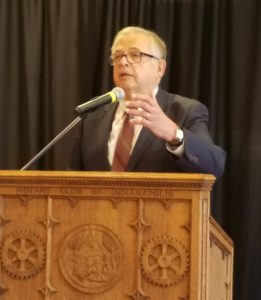From children of Chernobyl to children of invasion, LifeNets steps in with relief
CINCINNATI, Ohio – Supporting much-needed safe relief for Ukrainian children and rebuilding bomb damage in homes, LifeNets International committed an initial $132,000 to directly support critical projects in war-torn Ukraine this summer. One project has brought nearly 100 children from devastated Chernihiv – including orphans and children without parental care – to a safe summer campground facility on the Transcarpathian/Romanian border.

The project, organized through the offices of Ukrainian governors of Vyacheslav Chaus (Chernihiv) and Viktor Mykyta (Transcarpathia), is providing a 60-day respite from shelling and living in bombed-out buildings from the Russian-Ukrainian war, according to Victor Kubik, founder of LifeNets International, a humanitarian organization.
LifeNets, a humanitarian not-for-profit (founded in Indiana), is also providing $17,000 in funds to staff workers of the Chernihiv Regional Center for Comprehensive Rehabilitation of Children with Disabilities and others to help repair windows and doors blown out by Russian bomb concussions. The humanitarian organization has also donated $40,000 for food relief for Ukrainian refugees fleeing the war.
The Chernihiv Center served to house and feed children during the early Russian occupation of the region.
Kubik discussed the projects during an Indianapolis Rotary luncheon address July 19.
 “As the New York Times documented in mid-July, homes of millions of Ukrainians are in ruins, seriously damaged, or in the hands of Russian occupiers,” said Kubik. “LifeNets has been a long-time supporter of various Ukrainian humanitarian projects, so we are using our direct contacts to provide much needed aid.”
“As the New York Times documented in mid-July, homes of millions of Ukrainians are in ruins, seriously damaged, or in the hands of Russian occupiers,” said Kubik. “LifeNets has been a long-time supporter of various Ukrainian humanitarian projects, so we are using our direct contacts to provide much needed aid.”
National media in Ukraine (https://cheline.com.ua/news/society/majzhe-sotnya-ditej-z-chernigivshhini-ozdorovlyuyetsya-na-zakarpatti-303482) is covering the projects supported by LifeNets, as medical and psychological experts have supported providing “psychological and emotional relief” from disruptive missile attacks and prior incursions and destruction wreaked by invading Russian troops (now withdrawn) in the Chernihiv region.
The city of Chernihiv (which had a population of 285,000 before the war began) and the shuttered Chernobyl (Chornobyl) nuclear power facility were among the first areas to be overrun by Russian troops earlier in the year. The Russians have since withdrawn, leaving billions of dollars’ worth of damage and ruin to housing, infrastructure, businesses and communities.
Chernihiv is located about 55 miles from the Russian-Ukrainian border and about 80 miles from Kyiv, the national capital. The city is 57 miles southeast from the entombed, but still radioactive Chernobyl Nuclear Power Plant. Chernihiv is home to the Revival Center for Children, a facility founded by Dr. Vasyl Pasichnyk, a pediatrician, and his wife, Natalya, also a medical provider. The Revival Centre was originally founded in part to support and treat children victims of the Chernobyl nuclear disaster and is the first project that LifeNets supported in the 1990s.
The boys and girls traveled to a newly reopened campground on the Romanian-Ukraine border in late June “to have some much-needed space to emotionally and psychologically recover from the terror of continuous shelling, bomb bursts, automatic gunfire, and Russian missile attacks in Chernihiv, which was one of the first cities attacked by Russia,” said Kubik. “They have lived for more than 100 days with piercing air raid and missile attack sirens punctuating their nights and days, which causes psychological trauma.”
Several of the teenagers and children are associated with the Revival Centre. “Dr. Pasichnyk saw how children are being emotionally impacted by living in a bombed-out war zone and asked if LifeNets could help support much-needed relief,” said Kubik. “The campground facility has been closed for more than two years because of the pandemic, but we were able to work with local trusted officials to overcome legal and supply issues to get the camp set up for the Chernihiv teenagers and younger children.”
The project grew to include orphans and other children from various schools in the Chernihiv region.
In a conversation through Starlink internet technology, Dr. Pasichnyk told Kubik how prices for everything in the region has skyrocketed and conveyed his and his staff’s deep appreciation for the two LifeNets projects. “The Revival center staff is very concerned about repairing the bomb concussion damage in their homes before the fall and winter set in,” Kubik said.
As noted, the project to help Ukrainian children is one of three relief projects currently funded by LifeNets. LifeNets is providing funds for the children’s camp project, which is the first to join two previous long-time LifeNets programs together (the Revival Center and a current project to provide food and supplies for Ukrainian refugees fleeing the Russian war) in the Ukraine, and $17,000 for Chernihiv residents who work at the Revival Centre to purchase new windows and doors blown out by concussion blasts from Russian bombs and missiles. Additional funds for rebuilding and repair project are being contributed by church organizations and others.
“We are having to deal with several extra issues, both legal and financial, to transfer the funds safely and securely to Ukraine, but we’re getting it done,” said Beverly Kubik, who serves as chairman and president of LifeNets, and co-founded LifeNets with her husband Victor. “We are grateful to our Sabbatarian friends both for their prior work in supporting and housing Ukrainian refugees fleeing the country, and now for their work in arranging chaperones, support, and supplies for the 60-day camp.”
“Everything is much more expensive and far more complex today during the war than when we have funded and supported Ukrainian projects in the past,” said Kubik, who came to the United States in the 1940s as a Ukrainian refugee with his parents (now deceased). “We thank those who have contributed and shown an outpouring of support, and we ask those who are able and interested to consider supporting these important efforts.”
LifeNets is known for its capacity to identify, support, and fund individual projects that change lives and make a difference in situations that cannot sometimes be effectively addressed by larger humanitarian organizations. Persons wishing to secure more information or who desire to make a contribution can visit https://lifenets.org/
About LifeNets International
Founded in 1999, LifeNets International is a humanitarian 501 C 3 non-profit organization that develops and conducts programs offering practical assistance throughout the world. These programs promote the well-being and self-sufficiency of disadvantaged people through a variety of direct building projects (including drinking water access in arid rural regions), scholarships, agricultural support, and other aid. Where possible, recipients of LifeNews aid are encouraged to pass on LifeNets benefits to others through service. LifeNets keeps administrative expenses to a minimum, focusing on delivering the highest possible impact from donations. Listed by GuideStar (where LifeNets’ IRS Form I-990 can be viewed), LifeNets is transparent about its finances and regularly produces financial statements. For more information, please visit: https://lifenets.org/
Fore more information, contact Michael Snyder at MEK
Note: all services to LifeNets are provided on a pro bono basis by MEK.
